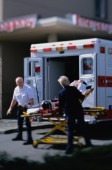
MONDAY, Jan. 21 (HealthDay News) — Performing CPR for longer periods of time boosts chances of survival in both children and adults in hospital settings, two large U.S. studies show.
The findings “are game-changing, and we hope these results will rapidly affect hospital practice,” Dr. Robert Berg, chief of critical care medicine at The Children’s Hospital of Philadelphia and a co-author of both studies, said in a hospital news release.
It’s widely believed that CPR, or cardiopulmonary resuscitation, is useless after 20 minutes, Berg explained.
Both studies looked at how the duration of CPR affected hospitalized patients who suffered cardiac arrest — where the heart suddenly ceases to function.
The first study examined the medical records of more than 3,400 hospitalized children in the United States and Canada who suffered cardiac arrest between 2000 and 2009.
The investigators found that more children than expected survived after receiving prolonged CPR, defined as lasting longer than 35 minutes. Of the children who survived after prolonged CPR, more than 60 percent had good brain outcomes.
Children hospitalized for heart surgery were more likely to survive and had better brain outcomes than those hospitalized for other reasons, according to the study published online Jan. 21 in the journal Circulation.
The second study looked at 64,000 adult hospital patients who suffered cardiac arrest between 2000 and 2008. Survival among patients who received longer CPR (median 25 minutes) was 12 percent higher than for those who received the shorter CPR (median 16 minutes).
Patients who survived prolonged CPR had similar brain outcomes as those who survived after shorter CPR, according to the study published recently in The Lancet.
Berg is the chair of the scientific advisory board of the American Heart Association’s Get With Guidelines-Resuscitation program, a national registry that tracks and analyzes resuscitation of patients after in-hospital cardiac arrests.
More information
The American Academy of Family Physicians has more about CPR.

